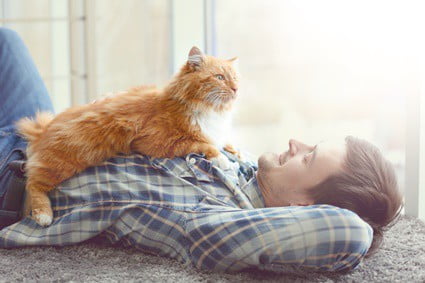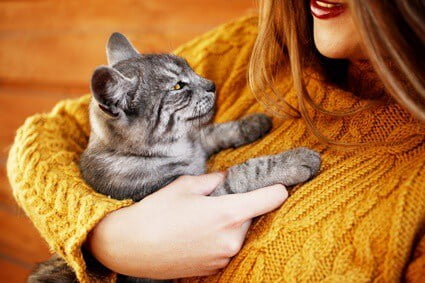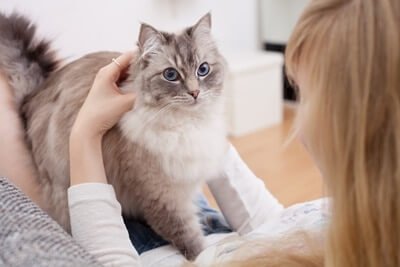Cats are known to have clear and forthright personalities. They can be picky eaters, have distinct preferences on how they’re petted, and even take longer to train. However, as your bond with your cat grows over time, you may notice it taking on some of your own traits. Some people even claim that their cats become just like them over time.
Cats do take on many of the personality traits found in their owners. They can even match your energy levels or mood, depending on how expressive you are. This usually happens when you play a key role during the cat’s early socialization years. Since you’re the primary person the cat is exposed to on a day-to-day basis, it takes its cues from you. If you’re calm, orderly, and affectionate, the cat is likely to mirror that behavior.
Owners that are aggressive, disorderly, or stressed often find their cats picking up these bad habits as well. That’s because cats learn behaviors and habits from their mothers and littermates. If you raise a kitten from a young age, the cat will likely pick up your routines and personality. If you adopt a cat later in life, it may still adapt to your character traits, just more subtly. Of course, a feline’s personality is also influenced by other factors, such as phenotype, breed, genes, its parents, and environmental stressors.
Do Cats Have the Same Personality as Their Owners?
As stated, a cat’s personality traits can be influenced by its owner. In fact, this happens in the same way a parent influences a child’s personality.
By spending a great deal of time around your cat and letting it see your natural reactions, you’re giving the feline cues on how to act. This plays in closely with how kittens learn to behave from their mothers or littermates, even if no humans are around.
Why Do Cats Copy Actions?
In the wild, cats copy actions from other cats to adapt to their surroundings. Instead of learning each habit or behavior by itself, it can take cues from its elders to avoid mistakes. This helps it avoid running into predators, offending stronger cats, or failing to locate food. Normal actions that cats learn to adopt include:
- How much force to apply when biting
- How to clean themselves
- How to locate prey
- How to fight or pin prey
- How to interact and compromise with other cats, especially over disputes
While you may not be teaching your cat how to bite, you are teaching it how to deal with stress or when to be excited. Emotional states are often shared in cat colonies. For example, one feline in a colony might suddenly appear frightened. This will signal the other cats to respond to a threat they cannot see, but they have a good guess is there.
As a result, your cat will learn to show its happiness and express sadness much like you do. You might be the only companion it has, and therefore its only family member. It trusts you for food, water, and shelter. Therefore, it will trust you to read the room and tell it how it should feel.
Of course, cats won’t be a carbon copy of your personality. Most will still retain their own personality traits and may even stubbornly keep up bad habits, even if you attempt to train those out. However, you can rest assured that you have an influence.
Do Cats Act Like Their Owners?
Some cats learn to act like their owners, but this can have good and bad results alike. Many owners believe their cat mimics their behavior and personality traits as a sign of affection. This is partly true, as the cat views you as its family member and wants to mimic your behavior. However, according to PLOS One, an owner’s neuroticism (or negative emotional state) can also impact a cat’s personality.
By cultivating a home environment that’s unstable or chaotic, your feline will pick up on the cues of stress, discomfort, and uncertainty. By creating a home with fixed routines and healthy outlets, your cat may become more balanced and calm. What personality traits have the most impact? According to the study, cats were particularly receptive to:
- Openness
- Conscientiousness
- Extraversion
- Agreeableness
- Neuroticism
Openness
In the PLOS One study, cat owners who displayed openness had cats that displayed similar traits. In this context, ‘openness’ is described as being open-minded, curious, and imaginative. The cats were friendlier, less aggressive than average, and less aloof. However, researchers also noted that these owners were less likely to give their cats the freedom to roam outside.
Conscientiousness
A person with conscientiousness can be described as one with good self-discipline. These individuals are less spontaneous and tend to create and follow set plans. The study found that cats raised by such owners were friendly, less aggressive than average, less aloof. They were also less fearful or anxious than other cats.
Extroversion
A person who displays extroversion tends to be more excitable, sociable, assertive, and talkative than average. Extroverted owners had cats that were also friendlier than average. They were allowed to roam outside freely, and they generally maintained a healthier weight.

Agreeableness
Agreeable people can be described as warm and friendly. They are optimistic and get along well with others. The study found that agreeable owners had cats that were less aggressive than average. They were more open to cuddling and less picky about food.
Neuroticism
It appears that the downsides of personality traits carry more weight with felines. Cats exposed to positive traits slowly gravitated in that direction. However, cats exposed to negative traits appeared to adopt bad behavior right away. This was most significant when the owners displayed high levels of neuroticism.
Neuroticism is another term for emotional stability, or one’s ability to maintain balance and stability. A person with high neuroticism has a greater tendency to feel negative emotions. Unfortunately, such tendencies can spill over to their cats as well.
The study found that owners with high neuroticism had cats that displayed higher levels of aggression. They were also:
- More anxious or fearful
- Exhibited behavioral problems
- Had a higher chance of developing stress-related illnesses
- Were less likely to be allowed to roam freely
The above study does not establish a direct link between an owner’s personality and their cat’s personality. However, it does illustrate some degree of influence, especially about neuroticism.
When Do Cats Develop Personalities?
There are no official studies to say when a cat develops its personality. Even still, many believe a feline’s character traits begin developing when it starts to undergo socialization. That’s because a cat’s personality is not only influenced by its genetics and its owner but also by its experiences.
For example, exposing your cat to different groups of people from an earlier age may make it friendlier and curious to try new things. A cat that hasn’t undergone this socialization may be more fearful and less interested in interacting with the world around it.
The best time to help your cat with socialization is between 2 and 7 weeks of age. Owners can use this period to expose their cats to new surroundings, objects, and people. The sooner the cat is exposed, the more likely it is to adapt to those conditions permanently. There’s a reason why mother cats teach their kittens core skills early on.
A young kitten is more likely to adopt your personality traits, especially if you raise it from birth. That isn’t to say that adult cats are unable to take on their owners’ personalities. Instead, it will just take more time. The traits may also be less defined, since the cat is cherry-picking which traits to maintain from previous experiences and which to take from you.
Keep in mind that a cat’s personality will also change over time. Many cats lose their curious and playful nature as their energy levels wane from old age. Your cat may also find its senses declining, so it’s less expressive or reactive. This doesn’t mean it learned that from you; it’s merely adjusting to its new pace of life.
Do Cats Copy Human Behavior?
Cats mirror human behavior, but part of it is credited to how their owner exposes them to the world. For example, if you’re less social than average, you may be unlikely to call people over to meet the new kitten. As a result, the kitten may also become less interested in meeting new people and exploring new things.
Conversely, extroverted owners may introduce the kitten to a wide variety of people to help it with socialization. This could make the kitten more comfortable interacting with new people. That results in a more extroverted and less aggressive personality.
The longer the cat spends with new things, the more time it will have to form healthy experiences and opinions. As such, owners have some degree of influence over their cat’s eventual personality. This is based not only on how you act but on how the world around the cat acts.
Do Cats Mirror the Personalities of Their Owners?
Cats mirror their owners’ personalities in a variety of ways. However, the effect may not be as pronounced as one might think. These are animals, after all, and animals are driven primarily by their own natural instincts.
A cat jumping for joy at the sight of food may be excited due to normal hunger. It’s not because it has an inherently joyful personality. Likewise, a cat that eagerly stalks birds or mice hasn’t necessarily learned how to be an aggressive hunter from you. Instead, it’s reacting based on evolutionary traits that drive it to hunt, even if it’s not in want of food.
Cat owners should be careful to distinguish between innate cat behaviors and the personality traits that overlay them. Your cat does pick up traits from you, but it’s not a perfect mirror.
Do Cats Mirror Their Owners’ Actions?
Cats do not precisely mirror your actions. However, your feline might recognize a pattern and copy a routine to some extent. For example, you aren’t likely to see your cat press the buttons on your remote control after watching you. Instead, the cat may:
- Decide it’s time to eat after watching you sit down for a snack or a meal
- Use the litter box around the same time that you go to the bathroom
- Understand when you normally leave the home or return, and come to greet you at the right times
- Know to curl up for a nap when you sit down to read a book, since it knows you won’t play with it
Do Cats Copy Human Behavior?
Cats are unlikely to mirror complex human behaviors. However, they may still mimic certain activities, such as flopping onto their stomach or rolling over.
This mimicry can be explained as observational learning. Cat behaviorists believe kittens learn various behaviors by watching and mimicking their mothers. This has been observed in a variety of animal species and isn’t unique to cats.
If you have been raising a cat since it was a kitten, it may start to believe that you are its mother and mimic your actions accordingly. This includes following you around the house and sitting down with you when you sit down.
Of course, this also means adopting a cat at an older age makes it less likely to mimic you. It will already know its favorite habits and routine and will feel less driven to copy yours.
Do Cats Mimic Their Owners Voice?
You may have heard your cat meow in a certain tone or with a particular melody. Most owners would ignore this. However, some keen listeners may have noticed that this meowing can resemble human speech in a way. This can lead you to wonder if your cat is attempting to mimic your own voice.
Believe it or not, cats do try and mimic their owners’ voices. They attempt to copy the tones and melody patterns they hear in an attempt to catch your attention. However, their vocal chords are shaped differently from that of humans, so their speech comes out as more meow-like than talking.

Factors That Influence a Cat’s Personality
Outside of your personality, many factors can influence a cat’s eventual character traits. By knowing what these are, you can understand how likely it is that your feline will mimic you. For example, some cats will keep very defined personalities all of their own and act nothing like you. The main influences of a cat’s personality include:
Phenotypes
A cat’s physical features are determined by its phenotype. Scientists believe that phenotypes may also play a role in influencing a cat’s personality. This might help explain why some animal subspecies, such as silver foxes, are friendly toward humans, while other fox variants are not.
Phenotypes influence a cat’s body size and type, coat length, and coat color. This influence may extend to their character traits in the sense that larger cats may exhibit more dominant behavior than smaller cats. These tiny cats are generally more timid in nature.
Similarly, long-haired cats tend to be less active than their shorter-haired counterparts, according to Scientific Reports. Researchers believe it’s because of how the two diverged morphologically and behaviorally in their evolution.
Breeds
Cat personalities may also differ depending on their breed. Coat colors may have some influence on a cat’s personality, but the breed is a much better predictor. That’s because personality traits can be heritable.
It has been observed that cat personalities are often passed down from parent to child and across several generations. This means a friendly and outgoing cat may have had a similarly friendly and outgoing grandparent or great-grandparent.
Paternal Inheritance
As mentioned earlier, cats learn various behaviors by mimicking their mothers. However, a cat’s personality may also be influenced by its father. According to Applied Animal Behaviour Science, kittens with friendly fathers exhibited similar friendliness toward humans.
Genes
Cats may also exhibit certain personality traits depending on a gene known as the oxytocin receptor gene. This gene plays a key role in an animal’s social, emotional, and cognitive behavior.
This means a cat may be friendlier or more likely to form an attachment with its owners. It just depends on the genes it possesses and how they function.
Brain Activity
Some aspects of your cat’s personality may also be controlled by its brain activity. Researchers believe activity in different parts of a cat’s hypothalamus impacts its aggressiveness.
This includes how it responds to the behavior of other cats or people. A cat may make different vocalizations or postures when threatened, based on its hypothalamus activity. In some cases, a cat may stalk and kill its prey without making a sound simply because its hypothalamus activity is telling it to be more stealthy.
Stress Response
A cat’s stress response may also show up as a personality trait. Like most animals, cats possess a strong fight-or-flight response. However, some cats are more attuned to flee from a confrontation, while others are eager to fight.
You should note that this stress response could be a combination of nature and nurture. Some cats are born with a fearful nature, while others may develop it after a bad run-in with another animal.
Cats do become like their owners over time. The people that raise them or take care of them aren’t the only contributing factor, sure. You will have a significant influence on your cat, though, especially if it’s young.

